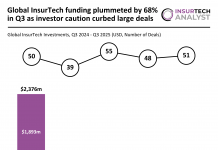In an era defined by rapid technological strides, the insurance industry stands on the cusp of an extraordinary evolution, heralding a new dawn through the prospect of a digital transformation. Amidst this profound change, the sector has emerged as a haven of innovation, embracing a digital metamorphosis that promises a new beginning in the space.
Gone are the days of traditional, paper-laden processes; the insurance landscape now gleams with the sheen of digitisation, offering a treasure trove of opportunities. Imagine seamless customer experiences, where policy acquisition and claims are but a few clicks away, adorned with the convenience of swift, user-friendly interfaces. The success of this evolution lies in the potential empowerment of customers, granting them greater autonomy and accessibility, turning what was once arduous into effortless encounters.
What is prompting this transformation?
A report by InsurTech Ushur supports that automation in the sector is boosting customer experience. The detailed blog explained that claimants are already distressed when forced to file a claim and making this worse with a complex and lengthy process will not help. A convoluted interaction with their insurer is not acceptable in this era, with technological competency now higher than ever. Customer dissatisfaction stemming from inefficient claims process can lead to them seeking better experiences elsewhere. Another study from Ushur found that over 85% of those frustrated during the claims process considered switching insurance providers.
To retain customers and optimise their resources, insurers must revamp the entire claims journey. Although the first notice of loss (FNOL) stage is relatively well handled, subsequent stages see a drop in service quality, resulting in an overall negative impression of the insurer.
James Doe, Sales Manager at Novidea, concurred with Ushur’s assessment, claiming, “As the insurance sector becomes more digital, consumers are increasingly demanding a more seamless and personalised experience. Where businesses are transacting directly with their consumers, they are adapting their client experience expectations to reflect what consumers already get on their phones, apps, or preferred websites. These consumers expect insurers to offer user-friendly online platforms.
“From the user perspective, whoever they are, quick and efficient applications that are intuitive to use whilst responding in the same way as your favourite search engine are essential. This change in consumer behaviour puts pressure on insurers to invest in digital technologies to meet these expectations. Failure to do so can result in customer dissatisfaction and the loss of market share and challenges attracting the people you need and want to run your business the way you want to.”
Further pressure for brokers/insurers/MGAs has now been placed with the FCA, releasing the new ’Consumer Duty’ for retail clients. Whilst there may not be anything groundbreaking in the recent announcements, the pitch has been well rolled for future governance. This puts additional pressure on the needs of industry practitioners to take another look at transformation across the board.
The future, threats, and opportunities
Ultimately, the industry is developing and transitioning at a rapid velocity. For many, solutions such as AI and machine learning will allow carriers to fundamentally change their product. It’s more about revolution than evolution, leaving many companies as big beneficiaries with quicker, more efficient processes, as well as vastly lower overheads giving them a higher profit margin.
Novidea’s Doe certainly believes this, admitting that many firms now need to embrace digitisation to truly take advantage of a new wave of innovation and send their firms to the next level, even likening the potential to be as revolutionary as Henry Ford’s introduction of the modern production line.
“As Henry Ford once said, ‘If I had asked people what they wanted, they would have said faster horses’; but then he mass-produced the car and the world changed practically overnight. To stretch the analogy, established carriers are aware of the potential of the car, but they are struggling to see that they are losing out relative to their peers. So, unless they attract talent who have seen the light elsewhere, or they look in envy at peers who have made the jump, they are perhaps reticent to green light the change today that they know is coming one day,” Doe enthused.
Ultimately, InsurTechs operating at the top of their game will look at the digital transformation of the space as golden chance to position themselves well in the market. Despite risk that are often present with sweeping revolutions, carriers need to look at this change in age as a time to grab the proverbial brass ring.
Doe said, “It is a confusing and somewhat bewildering world out there and there is every reason to look at digital transformation with contempt, fear, or loathing. But if you scratch beneath the surface, you will see that in your everyday life you are already getting the benefits (see mobile banking, shopping apps, weather apps, news online, etc.) and there is a logical and well-trodden path to move your business toward digital transformation without destroying the core of what made your business successful in the first place.
“Transformation is not trying to make the industry homogenous. As an avid F1 fan, I was delighted that for the Singapore Grand Prix in 2023, the top four cars were within two seconds of each other. They were all playing to the same rules and the only shared component that I know of is the engine management computer. So, with their own teams of people, working to their own core values and aligning to their own brands they were able to produce products that were competing against each other at the highest level.”
It is this competitive spirit and innovative thinking that looks firmly set to see the very brightest minds in the InsurTech space take the sector to the next level. Digital transformation is here, and now it is changing the game for the better.
Copyright © 2024 InsurTech Analyst










